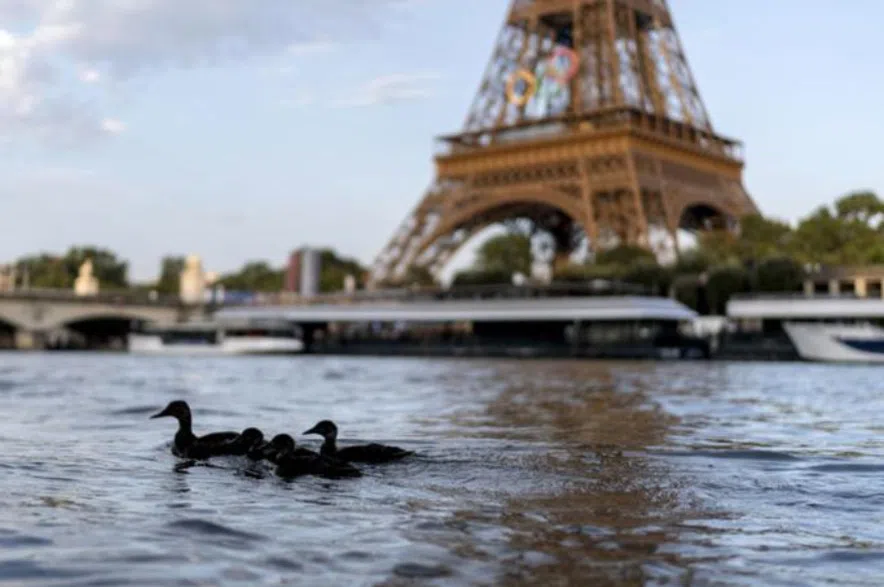Concerns about water quality in the Seine River led Paris Olympics organizers to postpone the men’s triathlon Tuesday, with officials hoping the swimming portion of the race will be able to go forward in the long-polluted waterway in the coming days following an expensive cleanup effort.
Organizers said they will try to hold the men’s triathlon on Wednesday instead. The women’s competition also is scheduled that day, but both will only go forward if water tests show acceptable levels of E. coli and other bacteria in the river. Friday is also planned as a backup date.
However, storms or rain are forecast Tuesday night through Thursday, which could complicate efforts to reschedule the events because rain generally causes bacteria levels in the Seine to rise.
Paris experienced a downpour during the Olympic opening ceremony Friday, with rain persisting into Saturday. The swimming portion of training events meant to let the triathletes familiarize themselves with the course was canceled on both Sunday and Monday because of concerns over water quality.
“There are unfortunate meteorological events outside of our control,” said Aurélie Merle, the Paris 2024 director of sports. “But otherwise the project is still very strong. When we see the impact on the quality and the legacy that we can leave also to the Parisians, we all feel extremely proud of what we’ve done so far.”
The delays come after Olympic organizers and city officials had expressed confidence in recent days that bacteria levels would improve as skies cleared and temperatures warmed this week, but that apparently wasn’t sufficient to ensure the athletes’ safety. The sun’s ultraviolet rays can kill the bacteria and lower levels, and Tuesday is hot and sunny.
Paris spent 1.4 billion euros ($1.5 billion) to improve the water quality in the Seine so the swimming portion of the triathlon and the marathon swimming event next week could be held in the famed river that runs through the city center. But bacteria levels have remained in flux.
The decision to postpone the men’s triathlon followed a meeting early Tuesday that included the sport’s governing body, World Triathlon, its medical team, the IOC and city officials.
“Despite the improvement on the water quality levels in the last hours, the readings at some points of the swim course are still above the acceptable limits,” organizers said, stressing that their “priority is the health of the athletes.”
Paris Deputy Mayor Pierre Rabadan said “the trend is improving” but “we are still not below the necessary threshold.”
To hold the two competitions on the Seine on Wednesday “seems to us to be the best option,” he said. However, he did not rule out further delays ”if there is an issue tomorrow after the results of the analysis.”
Daily water quality tests measure levels of the fecal bacteria E. coli, with a safe limit of 900 colony-forming units per 100 milliliters determined by European rules. Monitoring group Eau de Paris releases data each Friday, but it is updated only through the previous Tuesday.
One of four test sites was below the threshold for E. coli Tuesday morning, said Merle of Paris 2024. Two other sites were just above the limit and one was more elevated, she said, citing a range of 980 to 1,553.
High levels of E. coli in water can indicate contamination from sewage. Most strains are harmless and some live in the intestines of healthy people and animals. But others can be dangerous. Even a mouthful of contaminated water can lead to diarrhea, and the germ can cause illnesses such as infections in the urinary tract or in the intestines.
Efforts to make the river suitable for swimming included the construction of a giant basin to capture excess rainwater and keep wastewater from flowing in, renovating sewer infrastructure and upgrading wastewater treatment plants.
Paris Mayor Anne Hidalgo very publicly took a swim in the river two weeks ago, along with Paris 2024 chief Tony Estanguet. Data released last week show that E. coli levels at the Bras Marie were at 985 units per 100 milliliters that day, slightly above the established threshold.
The men’s triathlon is now scheduled to start at 10:45 a.m. Wednesday, which may make the heat more of a factor with the event finishing at the hottest part of the day. World Triathlon is planning to provide ice and water stations along the course for the athletes. The women’s race is set to go forward at 8 a.m. as originally planned.
If the river isn’t safe for swimming after delays, that part of the race would be scrapped and only the cycling and running portions would go forward. That happened last year at the European Championships when the triathlon format was switched because of water quality issues.
“It’s just another situation of the competition,” said World Triathlon president Marisol Casado, pushing back against the idea that a switch would be unfair to triathletes who excel in the water.
Other swimming events planned in the Seine are the triathlon mixed relay on Monday and the women’s and men’s marathon swimming events on Aug. 8 and Aug. 9. Marathon swimming could be relocated, if needed, to the Vaires-sur-Marne Nautical Stadium in the greater Paris region, which already hosts rowing and canoeing competitions and can accommodate up to 15,000 spectators.
But it’s a logistical challenge for triathlon to switch swimming locations given that routes are already set up for cycling and running.
“We are sympathetic,” Merle said. “Let’s see how it goes.”











